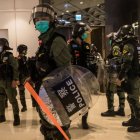The number of people convicted of sedition in Hong Kong under Article 23 increases to four
The local government enacted this controversial and authoritarian law to suppress political opposition and align more closely with China's broader political dynamics.

Police in Hong Kong
A man was jailed Friday in Hong Kong for posting "seditious" messages on social media, becoming the third person sentenced to prison in two days under the new national security law.
The man, a 58-year-old unemployed man, was sentenced to 14 months in jail after pleading guilty to posting 239 messages considered "seditious" on Facebook, Twitter and YouTube, according to a West Kowloon court ruling.
The convicted man "intended to lead other people to hatred and contempt of the Hong Kong government and law enforcement, which would lead to social breakdown and division," the court's chief magistrate, Victor So, said in the ruling.
The defense argued that some of those accounts had less than 20 followers and the man sought to gain validation from others rather than incite anyone to sedition.
Two other Hongkongers, aged 27 and 29, were sentenced Thursday to 14 and 10 months in jail for wearing a T-shirt with the slogan "free Hong Kong, the revolution of our time" and writing phrases such as "a self-reliant nation, an independent Hong Kong" on bus seats.
Hong Kong adopted a new national security law in March, known as Article 23, which increases jail terms for sedition charges and is the second reform imposed by Beijing since 2020 to tighten rules, following mass pro-democracy protests the previous year.
With Article 23, Hong Kong continues its process of surrendering autonomy and individual freedoms to Beijing, as it increasingly integrates the semi-autonomous territory into its authoritarian dynamics, generalized in the rest of the country ruled by the Chinese Communist Party.
Article 23 was a response to the wave of mass protests that flooded the streets of Hong Kong from 2019 to 2020, in favor of more freedoms and a separation of powers. The protests sought greater international openness, rather than rapprochement with Beijing.


























